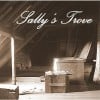Panda 3.6 update April 27
Whew, Google's been coming thick and fast with the updates lately: killing paid blog link networks, Panda 3.4, Panda 3.5, Penguin, the glitch with parked domains, and now Panda 3.6 only 8 days after the last Panda. It generally takes a few weeks to collect enough data to be sure of a change in traffic. We don't have that luxury this time, so it's very hard to tell which algorithm change (domain-level, backlinks, or Penguin's webspam penalty is the cause of any traffic changes.
Early results from Quantcast suggest a slight Panda 3.6 traffic downtick, and a slight uptick for Squidoo, but it's too early to be sure. Need a bigger sample size.
It's hard to adjust strategies when you don't know the cause of a traffic fluctuation. I've seen a lot of flailing, even in the SEO industry, as people guess what's causing fluctuations and rush to apply leeches or other palliatives that may not have anything to do with the cause of their traffic changes.
Other than avoiding link dropping in non-relevant places like link directories, and avoiding excessive keyword stuffing practices, I can't see that most of this flailing will do any good.
One thing that's been lost with all this flailing: there is ever more and better content on the web, and generating "good enough" articles on a particular topic is... no longer good enough! Why should people come to your page? Why stay? Isn't there something better out there? When PotPieGirl and I uncovered Google's internal quality raters guidelines last fall, which someone had unwisely left in a public folder on the Amazon cloud, it gave us a very good insight into the guiding orinciples BEHIND all these changes.
The standards set out in those guidelines are quite high, although the algorithm can't always deliver sites that live up to the standards. They're trying to discover and define sites that are vital/essential, like the USGS earthquake page for the search "earthquakes." A hubpages article can never reach the top level of google rating, which is reserved for pages that are the go-to page for a particular seach (e.g. Amazon.com when someone searches for "amazon"). The best we dan hoe for is to get an article to rank one or two notches down, an essential/authoritative article on a topic which is so good, so authoritative, so excellent and useful for that search that it outshines most other pages on the web and (more importantly) provides essential information, exactly the kind of content the searcher is looking for, excellent resources, so good that they will probably look no further.
It's hard to write an article that's essential to a particular search and topic, or at least highly effective and relevant, as opposed to just "good enough." Looking at my own online work, only a very small number of articles measure up. But if we make that a priority, and make reader engagement and experience a priority, we have a little better chance of being immune to Panda and slightly favored by Penguin.That explains a lot. sallystrove.hubpages.com will never be vital or essential. It may lend insight and contribute to understanding, but it will never be, in this google-dominated internet sphere, a place of authority, and more important, it will never be an ad revenue generator of the scope of National Geographic or The New York Times or YourFavoritePornSite. This whole thing sucks. Thanks for shedding light that makes sense about why indie writers connected to content farms will continue to sink in ratings and earnings.
An update on the Penguin.
It appears to be a Shame and Blame and Dob in your Mate process. I have various websites and I received this message with a request to remove a link from one of my sites:
"Its very important we get our links taken off your website. Our site has been flagged and we are drawing up a backlink report that we are filing with the Google Webspam team. It is a really good idea to not have your site on that report."
Very interesting - probably spells the end of reciprocal linking and the end of the 'links' page on a site - even if they are related.What's that? How did I miss that? That sounds like it should've been big news!
I know some people will find that depressing, but really, isn't it a good thing?
Remember when being a professional writer or a journalist meant doing a long apprenticeship, honing your words, doing your research and becoming an expert in your craft? When loving to write wasn't enough, you also had to have exceptional talent and be prepared to work hard?
The internet and the advent of sites like HubPages meant anyone could be a writer. It's meant a dumbing down of and loss of respect for journalists and writers - with a corresponding loss of jobs and loss of income for many. Why pay journalists and writers when you can get "citizen journalists" willing to do the job for free?
I've appreciated my run as a "writer", which I'd never have had without the internet. But if the algorithm ultimately gets it right, and we go back to the days when only the best quality writing gets read, I don't think that's necessarily a bad thing - even if it means I lose out.We may be 'amateur writers', but so are most best selling book authors!
We are not journalists, and never claimed to be, we are internet writers and researchers, and I love doing this.
We put so much more into a hub than most most websites put on posts.
Look at Amazon product descriptions, and tell me that we can't write it better - most times those 'descriptions' tell us very little about the product. The buyer would have to go searching all over the place to find out more details, and usually end up on some kind of review forum full of badly written opinion pieces.
That is where we come in. We do the research, if it isn't a product or service we know personally, and collate it all into a readable, and hopefully, useful, hub.
Journalists would not want to be bothered with such mundane things, when they have news stories to cover, and dirt to dig up on someone or some political regime.
We can fill a gap and we are sorely needed.
I think there is room for both professional and amateur writing online, and hopefully one day Google will get its algorithm right so that badly written, thin articles fail every time and only the cream rises.Izzy - I don't feel writers are categorized by the vehicles they use - writers are writers, and their skills can ne applied in journalism, the Internet or wherever there are facts, information, prose or entertainment to be conveyed.
Many people on this site may have started writing because the Internet provided a venue, but their success will be based on quality, not whether they happened to be published elsewhere before coming here. There are great writers on this site. And some who are honing skills and becoming great. Because the site doesn't (as yet, at least) filter or audition people before they can publish, there are also some who would like to be writers but may not be well-suited for it. And, there are some who join the site purely to game the system, with the idea they can instantly become AdSense Tycoons.
I feel any effort by Google or the site to focus on and reward quality will only help, in the long run. It is disheartening to those of us for whom writing has been a career, and who have worked hard for years, to see the writing profession devalued through the idea that anyone who has a computer and Internet access is, therefore, a writer (or a skilled web developers). That's like saying anyone with a stove knows how to be a professional chef, or anyone who buys a car can already drive.
Social media has muddied the water, because some people misconstrue their popularity on FB or a blog (because perhaps they interact well) as a reflection on their ability to write. People do use the Internet to interact, but they search topics to get information. Writers who can distill salient facts into readable and informative articles are the backbone of that type of content.
Long post - I just wanted to make the point that starting a writing career on the Internet is no different from starting it in a newsroom or on a magazine staff. There are differences in styles and other things, but good writers can adapt to the venue, vehicle and audience.I agree, content writers should be able to produce top-notch content that gives awesome answers to particular queries.
Still, it's important to note that the algorithms search engines use to determine quality content are changing. Great content is sometimes temporarily lost with each new change. There will be corrections. I programmed for a bit, when I was young, and I can tell you there is some trial and error that goes into it.
Take heart from that fact, any that have been penalized. No one knows what the final algorithm (so to speak) will demand from content writers.
Those of us that "uncovered," it had the good sense to keep shtum. I was a tad annoyed when the potpie person (I think it was her - I can't recall for sure, but some one did) went and told everyone.
If you want a copy - drop me a line.I found it from a link on ana hoffman's subscriber email. It quickly was deleted after Google found it had been 'uncovered'.
And not have it sound like the zillion other articles on the same topic.
I don't know much about SEO, but I would think the article still needs author authority with decent backlinks.Is that potpie girl?
I got a hold of it ages ago, and based a lot of decisions on it back in the summer last year. Their stated intentions to remove fake product reviews and other spam was interesting. They are claiming to be able to identify reviews that are written by travel writers who have never experienced the place they are talking about by the way it is written. I find that hard to believe myself, but have adapted my content to reflect the need to prove I handled the product, or visited the place.
Adapt or die.No, I don't believe they're the same person. Ana is a smart marketer and I've learned a lot reading her tips. Ana mentioned potpiegirl. I did read it and have found it to be very helpful, and interesting.
All of your hubs read very well, and we know that you're a professional. It's good to see you back in the forums.
How's France??potpiegirl has some pretty decent discussion on her site and I do like her innovative attitude. Her recent blogs about breaking up with google are probably what many feel at some point. Somewhat of a toxic relationship, you give me (big G) what I want (more $$$) and I'll love you (send you lots of traffic) until someone better comes along.

I've read decent travel articles, but I can always tell if the writer has actually been there. For me it takes away the credibility if someone is saying how great a place is or you must see this place, but has never been there. Why should I believe them? I want to hear about it in the words, the vivid descriptions, the experiences.
Whether G can tell, I don't know. I think they have entirely too much power, it's crazy.
How about adding innovate, adapt or die?I can always tell fake travel pieces, too - they're very superficial, and aren't written like someone really experienced the place.
I have read plenty right here on HP. I have been to some of the places they talk about. Some of them are like lists of places to see in certain states, etc.
I apologize! That was partly me being an idiot.

The old Guidelines had been leaked on the web years before. Then, last October, PotPieGirl linked to the 2011 guidelines on her blog and discussed them thoroughly. Having not seen them before, I stared at the link buried down in her discussion and sent a note to SearchEngineLand asking, "Is this real? Are these legit? Holy cow!" Barry Schwartz said, "Yep, they're legit!" and ran with the story, after which it got picked up on a few other SEO sites ran with it...and of course Big G hastily patched the leak. G might not have caught up with it if it had stayed on PPP's blog, but once the story went viral they acted.
Oops.
Anyway, now I'll only relay publicly announced news such as the fact that they just confirmed Panda 3.6. Every time there's an algorithm change, I check Quantcast to see what the impact is on total site traffic on the sites where I'm active. Also, I check searchengineland and G's blogs for clues about the reasoning behind the change.
I summarized the gist of the raters' guidelines on my "Quality Guidelines -- Do You Make the Cut?" hub.No need for apologies. I learned a similar lesson years ago. Now I am a little more circumspect when it comes to giving away information. If everyone does it - it stops working.

What is Penguin? I have read reactions elsewhere, but haven't found much. All I can tell is that it's distinct from the Panda iterations and that its target is backlinks. That makes it sound like a penalty filter (negative) rather than a rating algorithm (potentially positive). Greekgeek's quote here is similarly confusing. Does Penguin have the capability to penalize or to favor?
Penguin's debut (April 25) made a radical change in my traffic. It seemed to have counteracted a Panda penalty that had limited my traffic to about 6 per day (total subdomain) since January 11. Since Penguin, my traffic has reached new highs and hasn't dipped below 100, which is about double previous averages. That's enough data to tell that penguins can beat pandas, but I'd still like to know whether they're fighting offense or defense.
see the video below - Penguin is a filter for excessive on-page seo
Panda hits the off-site stuff (links)
=> Double wham bam
http://www.article-writer-pro.com/refer … enguin.php
Panda, Penguin, whatever.....
"Early results from Quantcast suggest a slight Panda 3.6 traffic downtick, and a slight uptick for Squidoo, but it's too early to be sure. Need a bigger sample size."
It's all gotten so cryptic.Thanks for this. The last paragraph is the gist of it, isn't it. It's easy to forget the focus that needs to be on our content with all the other worries (linking, keyword stuffing, duplicate content, etc).
Where ranking is concerned, I've found HP and Squidoo articles at page one rank 1, particularly in entertainment. Some topics, and I've run up against this wall myself, are either too saturated, or too saturated with quality articles written by known authorities on the topic. As HubPages continues its focus on quality, the site itself should gain standing over time. Like, you know, when people land on an HP or Squidoo page on a search, and click out. I think that'll change over time. I've already been sold on not doing it, because I've gotten valuable information from both content sites, by search.
There's less bad landings with both sites now, compared to a few months ago, even.I hope I have enough quality content to keep up with all of the changes.
It's a bit early to tell but I think my articles are at a similar level of craptitude. I have applied leeches to the more sensitive areas and am waiting for the nurse to return with my next medication. Meanwhile I shall cuddle my toy Panda... he's sleeping now.
Thanks, GreekGeek, for starting this thread. I know nothing, but I believe you do, so I'm reading and learning.
Thanks for this update, I have been going back and really looking at my tags and adding to them in the hopes that it will result in more search results and the like for my hubs. I am also doing my best to try to create quality content and actually show myself as somewhat an Authoritative voice on matters. I am also just trying to make up for matters by ensuring I at least publish 1 hub per day.
I am actually seeing better results though then in previous months. Last month I made the most I have so far, $1.50 and the highest earning in a day .30 cents. Nothing to brag about compared to some, but I am seeing better results instead of just .01 cents or .02 cents, closer to .10 cents and over.
- Will Apseposted 13 years ago
0
There are still areas where authority is less important than just producing a very readable page with plenty of info. Your tips for the latest Facebook game, for example.
On the whole, though, amateurs are going to have a tough time. - Will Apseposted 13 years ago
0
Raters are raters not the algorythm.
But if you care about raters:
http://www.seomoz.org/blog/16-insights- … guidelines
http://searchengineland.com/the-google- … book-13575
There is a lot of this stuff from various dates. What is probably more relevant is this: http://support.google.com/webmasters/bi … er=35769#3
This has a few points to make http://searchengineland.com/seotableThanks for the links. Definitely a few minor insights, but nothing life-changing.
The point is SEO will not get you back to earning money. The value in obsessing over it is past.
There is almost no place for mediocre (not bad, just mediocre)content to survive. Unless it happens to be enshrined with age. And that is not much protection.
Edit: I was in no way implying that your content is mediocre (I haven't read it). It is just a hardening conviction that nothing will save a page that is not simultaneously informative and engrossing for the reader.SEO is in its simplest definition is making your article search engine friendly. The rules may change, but SEO isn't really going to go away.
The problem with obsessing is that the algo is essentially a very complex mathematical equation and guessing at it, with all its nuances, is a strain.
Not only were the guidelines for raters shared here days after the first Panda, so was the application link to become a rater yourself!
The guidelines are important as they point out what the algorithm is supposed to be recognizing. Unless you can dissect and understand all the various patents that may or may not be integrated into the algorithm - the guidelines may just be the most important tool you could get your hands on for understanding what google considers to be "quality"
Its old news - but searches are rated as "Do/Know/Go" in the rater information - this was previously known as informational/navigational/transactional - how your page may appear based on the intent of the term may flavor how its best presented.
For example a page that displays high for a "navigational" search is not as likely to be discredited for having a high level of outbound links - as that is exactly the intent of the search.
The point is there is alot of nuance to search, I wouldn't be very quick to take any blanket "solutions" to heart about how YOUR content could be corrected.Re: Guidelines. I checked them when they came out and decided I couldn't possibly match up. Then I wondered if the entire internet was supposed to consist of a Wiki, Amazon and some health site.
I decided that it probably wasn't. That people would always still look for that which the internet gives us - the ability to surf through other people's achievements, thoughts, silliness and weirdness.
If Google does become a Wiki and Amazon linker then something else will take over - for those who don't want to spend their surfing hours in a boring public library.
Vive la difference!It's a fascinating subject area, especially for a lapsed mathematician like myself. I do sometimes wonder if everyone appreciates the relativistic nature of algorithms (I forget myself sometimes, so it's good to be reminded!).
The leaked guidelines bring home how many factors are at work in the Google algorithm and why the algo can't really be broken down into very simple rules and guidelines for writers - the algo is essentially a massive relativistic equation. That's why there always appears to be exceptions to each "rule". In reality there aren't any "rules", per se, morelike a multitude of comparative interactions of the elements that Google chooses to include in the equation. Subtle changes to the "weighting" of just one element can result in a radical change to an outcome, so if several elements are changed, it can easily become very complicated.
The complexity of the algo allows it to be generally very nuanced in the way that it processes the raw data, but can also ocassionally result in it throwing out some strange assessments.I just discovered that I made an ebay sale. Just wanted to share. I have already alerted the media.
Thanks. And congrats on the 100 followers.

Thanks! If I had an amethyst gem formation as my profile pic, I'd probably have 493, but I don't
 But seriously, I think it's awesome that 100 people thought my work capable enough to follow me. Many thanks to all!
But seriously, I think it's awesome that 100 people thought my work capable enough to follow me. Many thanks to all!What with this being a laid back Saturday, I just posted your 6 hot-hub links somewhere...
Another great & informative article - Thank You!
Whilst doing some background research about the same topics (Panda & Penguin), I came across this very informative Video: http://youtu.be/YURf5-djtlA
The video goes into detail about 'Penguin'; how it is implemented and 'what to do' or 'what not do' to ensure it doesn't affect your site/article. It also explains how 'Penguin' differs from 'Panda'
Related Discussions
- 173
How to Avoid a Panda Mauling
by Will Apse 13 years ago
There is a lot of SEO related stuff about Panda in these forums, so here is something about quality and the kinds of content Google is trying to find and offer to searchers:It comes from Amit Singhal, Google Fellow and High Priest of search.Would you trust the information presented in this...
- 17
Why Your Site Traffic Is Going Down... Google Panda Penalty
by Dilip Chandra 13 years ago
Google panda is basically a major tweak in search engine algorithm. Its aim is to push the quality web-site up and lower down the ranking of low quality content. Unlike all previous update, Google panda is a domain level penalty. It means even if you have 5-10 low quality content in your site, your...
- 30
Is Google Overwhelmed By Old Articles
by Ben Aidoo 10 years ago
Is it true that Google is inundated by billions of articles that it's suffering from a system overload, and unable to give quality attention to new and better written articles? Just imagine, the poor Google crawler had to sift through 14 million articles to come up with 10 results on page 1 for a...
- 31
5 Ways YOU Can Help Get Hubpages Rolling Again
by Henry 11 years ago
Hey folks. I'm a long time member here and an SEO guy by trade. I love this platform and want to support it. I've been digging into Panda data, and I have a few suggestions. Let's work together and 'right the ship!' 1) Start a brand new account today. Fresh content is what Hubpages needs. Google...
- 68
Google Algorythm Change and Hub Pages
by And Drewson 15 years ago
Here's an interesting message from Seekyt, which mentions Hub Pages fondly."Important DecisionMake sure you've read the news to the right before reading this paragraph. ---->There is always a way to get around these things; however, do we really want to "get around it" and try to...
- 23
Want to know what Google's looking for? (Advanced)
by Ellen 14 years ago
1. Relevance to search query2. Quality of content3. User experience4. Relevance to search query5. Authority of author (I hope Hubpages gets rel="me" working.)6. Relevance to search query7. Who's linking to you8. Relevance to search queryBut BESIDES that. Here's some useful stuff.READ...



























